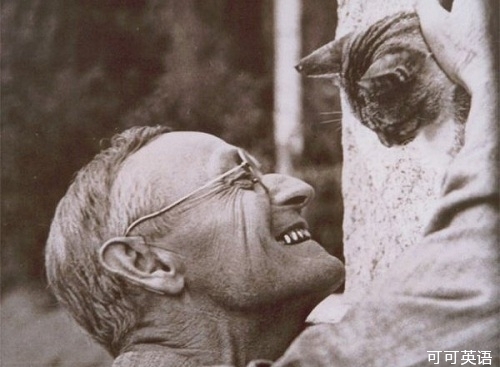(单词翻译:单击)
名著阅读
Then the time came when a dream warned him. He had spend the hours of the evening with Kamala, in her beautiful pleasure-garden. They had been sitting under the trees, talking, and Kamala had said thoughtful words, words behind which a sadness and tiredness lay hidden. She had asked him to tell her about Gotama, and could not hear enough of him, how clear his eyes, how still and beautiful his mouth, how kind his smile, how peaceful his walk had been. For a long time, he had to tell her about the exalted Buddha, and Kamala had sighed and had said: "One day, perhaps soon, I'll also follow that Buddha. I'll give him my pleasure-garden for a gift and take my refuge in his teachings." But after this, she had aroused him, and had tied him to her in the act of making love with painful fervour, biting and in tears, as if, once more, she wanted to squeeze the last sweet drop out of this vain, fleeting pleasure. Never before, it had become so strangely clear to Siddhartha, how closely lust was akin to death. Then he had lain by her side, and Kamala's face had been close to him, and under her eyes and next to the corners of her mouth he had, as clearly as never before, read a fearful inscription, an inscription of small lines, of slight grooves, an inscription reminiscent of autumn and old age, just as Siddhartha himself, who was only in his forties, had already noticed, here and there, gray hairs among his black ones. Tiredness was written on Kamala's beautiful face, tiredness from walking a long path, which has no happy destination, tiredness and the beginning of withering, and concealed, still unsaid, perhaps not even conscious anxiety: fear of old age, fear of the autumn, fear of having to die. With a sigh, he had bid his farewell to her, the soul full of reluctance, and full of concealed anxiety.
Then, Siddhartha had spent the night in his house with dancing girls and wine, had acted as if he was superior to them towards the fellow-members of his caste, though this was no longer true, had drunk much wine and gone to bed a long time after midnight, being tired and yet excited, close to weeping and despair, and had for a long time sought to sleep in vain, his heart full of misery which he thought he could not bear any longer, full of a disgust which he felt penetrating his entire body like the lukewarm, repulsive taste of the wine, the just too sweet, dull music, the just too soft smile of the dancing girls, the just too sweet scent of their hair and breasts. But more than by anything else, he was disgusted by himself, by his perfumed hair, by the smell of wine from his mouth, by the flabby tiredness and listlessness of his skin. Like when someone, who has eaten and drunk far too much, vomits it back up again with agonising pain and is nevertheless glad about the relief, thus this sleepless man wished to free himself of these pleasures, these habits and all of this pointless life and himself, in an immense burst of disgust. Not until the light of the morning and the beginning of the first activities in the street before his city-house, he had slightly fallen asleep, had found for a few moments a half unconsciousness, a hint of sleep. In those moments, he had a dream:
Kamala owned a small, rare singing bird in a golden cage. Of this bird, he dreamt. He dreamt: this bird had become mute, who at other times always used to sing in the morning, and since this arose his attention, he stepped in front of the cage and looked inside; there the small bird was dead and lay stiff on the ground. He took it out, weighed it for a moment in his hand, and then threw it away, out in the street, and in the same moment, he felt terribly shocked, and his heart hurt, as if he had thrown away from himself all value and everything good by throwing out this dead bird.
这时,一个梦提醒了他。那天晚间,他在卡玛拉那儿,在她那美丽的大花园里。他们俩坐在树下交谈,卡玛拉说了些引人深思的话,话背后隐含着某种悲伤和倦乏。她请求他讲述戈塔马,而且老是听不够,戈塔马的眼睛如何纯洁,他的嘴如何文静优美,他的笑容如何亲切,他的步态如何平稳。他不得不把这个活佛的事儿向她讲了好久,然后卡玛拉叹了口气,说道:“将来,或许要不了多久,我也会去追随这位活佛。我要把我的大花园送给他,信奉他的学说。”可是接着,她又挑逗他,在爱情游戏中怀着痛苦的热情箍紧他,咬他,淌着泪,仿佛要从这空虚而短暂的情欲中再一次挤出最后一滴甜蜜来。席特哈尔塔忽然明白了,淫欲和死亡是多么接受。然后,他躺在她身边,卡玛拉的脸紧挨着他,从她的眼睛下面和嘴角旁边,他清晰地读到了一种令人不安的文字,一种由细线和浅纹构成的文字,让人联想到秋天与老年,就像席特哈尔塔自己,年方四十,黑发间却已经出现了花白的头发。在卡玛拉俊俏的脸上记得写着疲倦,疲倦和业已开始的憔悴,以及有意掩饰的、还没有说出的、也许还没有意识到的不安:害怕衰老,害怕秋天,害怕不可避免的死亡。他叹息着向她告别,心里充满了不快,充满了隐秘的不安。
然后,席特哈尔塔回到自己家里和舞女们饮酒消磨长夜,对与他同等地位的人摆出轻蔑的样子,其实他已经没什么可自负的了。他喝了好多酒,午夜之后很晚才摸上床,虽然疲倦却很激动,真想大哭,几乎绝望,想睡而又久不成寐,心里充满了一种他以为无法再忍受的愁苦,充满了一种他感到浑身难受的恶主,就像酒的那种温吞吞的讨厌味道,就像过分甜腻而单调的音乐,就像舞女们那过分柔媚的笑容,就像她们的秀发和乳房那过分甜腻的芳香。但是,最让他恶心的是他自己,是他的香气扑鼻的头发,是他嘴里的酒味,是他的皮肤的疲沓与不适。就好像一个人吃得太多或者喝得太多,难受得呕吐出来,然后由于一身轻松而感到高兴那样,这个失眠者也希望能在一阵呕吐之后摆脱这些享乐,摆脱这些习惯,摆脱这种毫无意义的生活,摆脱自己。直到天光大亮,他的住所门前大街上开始了喧闹忙碌时,他才迷迷糊糊地睡着了,陷入一种半麻木的状态,一种睡意蒙笼。就在这片刻之中他做了一个梦。
卡玛拉养了一只奇异的小鸟,关在一个金鸟笼里。他梦见了这只小鸟。他梦见这只鸟儿变哑巴了,而平时早上它总是鸣啭不已。他发现了这点,就走到鸟笼前往里瞅,小鸟已经死了,直挺挺地躺在笼子底。他取出死鸟,在手里掂了掂,就把它扔了,扔到街上。他感到很害怕,心里很难受,就好像他把一切价值和一切美好都跟这只死鸟一起扔掉了。
背景阅读

本书简介:
古印度贵族青年悉达多英俊聪慧,拥有人们羡慕的一切。为了追求心灵的安宁,他孤身一人展开了求道之旅。他在舍卫城聆听佛陀乔答摩宣讲教义,在繁华的大城中结识了名妓伽摩拉,并成为一名富商。心灵与肉体的享受达到顶峰,却让他对自己厌倦、鄙弃到极点。在与伽摩拉最后一次欢爱之后,他抛弃了自己所有世俗的一切,来到那河边,想结束自己的生命。在那最绝望的一刹那,他突然听到了生命之河永恒的声音……经过几乎一生的追求,悉达多终于体验到万事万物的圆融统一,所有生命的不可摧毁的本性,并最终将自我融入了瞬间的永恒之中。
作者简介:
赫尔曼·黑塞(Hermann Hesse,1877.7.2-1962.8.9)德国作家。1923年46岁入瑞士籍。1946年获诺贝尔文学奖。1962年于瑞士家中去世。爱好音乐与绘画,是一位漂泊、孤独、隐逸的诗人。黑塞的诗有很多充满了浪漫气息,从他的最初诗集《浪漫之歌》的书名,也可以看出他深受德国浪漫主义诗人的影响,以致后来被人称为“德国浪漫派最后的一个骑士”。主要作品有《彼得·卡门青》、《荒原狼》、《东方之行》、《玻璃球游戏》等。
主要生平及创作
出生于德国西南部的小城卡尔夫的一个牧师家庭。自幼在浓重的宗教气氛中长大,1891年,他通过“邦试”,考入毛尔布隆神学校。由于不堪忍受经院教育的摧残,半年后逃离学校。这期间他游历许多城市,从事过多种职业。
在比较广泛地接受东西方文化熏陶之后,1904年,黑塞发表了长篇小说《彼得·卡门青特》,一举成名,从此成为专业作家。这一年他与玛丽结婚,移居巴登湖畔,埋头写作,1906年发表了长篇小说《在轮下》。这一时期的创作以浪漫主义诗歌、田园诗风格的抒情小说和流浪汉小说为主,作品洋溢着对童年和乡土的思念之情,充满对广大自然和人类的爱,同时也表现了青年人的精神苦闷与追求。
第一次世界大战后,黑塞的创作发生了明显的变化,他醉心于尼采哲学,求助于印度佛教和中国的老庄哲学,并对荣格的精神分析产生了深厚的兴趣。他试图从宗教、哲学和心理学方面探索人类精神解放的途径。这时期的长篇小说有《克努尔普》(1916)、《德米安》(1919)、《席特哈尔塔》(1922)、《荒原狼》(1927)和《纳尔齐斯与歌尔德蒙》(1930)等。这些书深受西方读者的喜爱,得到极高的评价,其中《荒原狼》曾轰动欧美,被托马斯·曼誉为德国的《尤利西斯》。
30年代后,法西斯在德国猖獗,黑塞对社会前途陷入深深的怀疑与绝望之中,但他仍不倦地从东西方宗教与哲学中寻求理想世界,《东方之行》(1932)、《玻璃球游戏》(1943)正是这一时期追求与探索的结晶。
黑塞被雨果·巴尔称为德国浪漫派最后一位骑士,这说明他在艺术上深受浪漫主义诗歌的影响。他热爱大自然,厌倦都市文明,作品多采用象征手法,文笔优美细腻;由于受精神分析影响,他的作品着重在精神领域里进行挖掘探索,无畏而诚实地剖析内心,因此他的小说具有心理的深度。1946年,"由于他的富于灵感的作品具有遒劲的气势和洞察力,也为崇高的人道主义理想和高尚风格提供一个范例",黑塞获诺贝尔文学奖。


